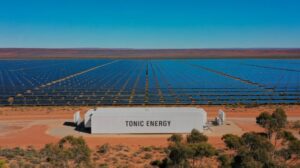ANALYSIS | ‘Yes, we should prioritise green hydrogen use in hard-to-abate sectors, but we also have to be pragmatic’

A consensus is emerging that, as green hydrogen will remain expensive for at least the next decade or more, its use should be prioritised in sectors where no alternative decarbonisation options exist — such as existing uses of grey hydrogen, such as ammonia and chemicals production, and iron manufacturing.
But in certain circumstances, for political or pragmatic reasons, it may still be required for uses in ways that would seem inefficient and wasteful elsewhere, experts told the Asia-Pacific Hydrogen Summit in Sydney last week.
“If you just look at [clean hydrogen usage] on a product basis, I think you’re looking at it the wrong way,” said Rupert Maloney, the executive director for alternative fuels at the Australian government’s green bank, the Clean Energy Finance Corporation.
“The right question for me is, what’s the alternative, if the given here from the broader cost perspective is we need to hit net zero.”
Because of the high cost of green hydrogen, “let’s make those parts of the economy [that require it] as small as possible, because where we can electrify and have more efficient decarbonization modes, we should do that”.
He pointed to fertilisers, explosives and iron as key sectors where hydrogen will play the leading decarbonisation role, with marine and aviation fuels — in the form of hydrogen or its derivatives — in a kind of second place, if biofuels cannot meet demand.
Article continues below the advert
“There are areas here [where] there aren’t alternatives. So we need to get on with it because we can’t sit around and wait for [green] hydrogen to magically get cheap and for it to be lower cost because [then] we won’t do anything until 2040 or 2045.”
Kobad Bhavnagri, the global head of strategy at research house BloombergNEF, told the final conference session, hosted by Hydrogen Insight, that there is still “a lot of wishful thinking about hydrogen’s use cases”, and that although “people are getting a little bit wiser and some of the silly ideas are starting to fall away, they’re still there — like, why are we still talking about [using hydrogen for] cars? I don’t know”.
He pointed to Michael Liebreich’s hydrogen ladder as “a really useful device to think about the priority of use cases”.
“We should start at the top [of the ladder], which is ammonia for fertilisers and explosives, methanol for chemicals and hydrogen’s usage in oil refining, and then all the other niche industries.
“We know that’s 100 million metric tons of demand, that’s trillions of dollars of investment — that’s enough to get a good way down the learning curve.”
Bhavnagri added that a lot of the potential use cases for clean hydrogen are “moving targets because, essentially, electricity continues to improve in its ability to do more and more things and meet the end use case”.
“And so there’s a lot of use cases where people would think ‘oh, that’s only going to be hydrogen’, and electricity keeps eating into its pie. So there’s uncertainty, it’s a moving feast.”
Fiona Simon, the CEO of the Australian Hydrogen Council, which co-organised the event, added that while her members have different views on how clean H2 should be used, “we also do have a general enough consensus with the position that we follow the evidence”.
However, she added that “the evidence shifts”.
“We’re all in this environment where we’re learning what kind of is a good idea and what isn’t and other technological advances turn up and economic and engineering pieces change, but the current evidence is what Rupert was saying and it’s the hard to abate areas.”
She added that while there were naysayers over the use of hydrogen as a fuel for heavy road transport, “there are enough people who are saying we actually need it”.
“In some cases, it’s going to be different things for different routes, different duty cycles. And the other thing that I’m finding is that when people take as a statement we are definitely going to need this or we’re definitely not going to, they’re not actually accounting for all the human stuff that gets in the middle.”
These include local governments telling bus operators that they can’t use electric buses because the additional charging time would necessitate an unacceptable timetable change, or trucking companies not being able to change their contracts to allow for more recharging time.
Simon also pointed out that electrolysers can help balance a renewables-heavy grid by being able to absorb excess wind or solar power, so that might increase the attractiveness of a particular use case for hydrogen locally.
Yoshi Saito, director of New Energy (Asia Pacific), at technology company SLB (formerly Schlumberger), pointed out that different countries have different circumstances that may require hydrogen usage in ways that would be frowned upon elsewhere.
“If you talk about countries like Korea and Japan, today there may not be enough renewables in the power generation mix and less renewables for other industry usage.
“If the country wants to prioritise [the use of hydrogen] in power generation, which is also hard-to-abate [in Japan and South Korea], it could be a unique policy to do a co-firing [with fossil fuels]. If that’s the demand created in those countries that drive the industries to scale, to bring the economies of scale faster, I think that’s the choice to make.”
Simon agreed that if countries wanted to use clean hydrogen as an energy vector, she would be happy for her members to supply it to them.
In a separate interview with Hydrogen Insight, she added: “In a lot of the debates [about clean hydrogen usage] on LinkedIn, you see the perfectionists say that this or that is too inefficient. I get that, and I get that physics and chemistry are a thing, and engineering is a thing. But politics is a thing too, and I think what we’re finding that maybe you do [use hydrogen] for less efficient things, because that’s how we do stuff. It’s not like fossil fuels are all that efficient.”
Simon explained that she does not believe hydrogen should be used wherever possible and therefore avoids terms such as “hydrogen economy”.
“I fully subscribe to the idea that just because you can, doesn’t mean you should. I think we are still discovering how hard it is [to decarbonise with green hydrogen] and realising there’s a bunch of things we probably don’t want to do after all… I think that’s the phase we’re all collectively going through now… but we’re still trying to work it out.”







